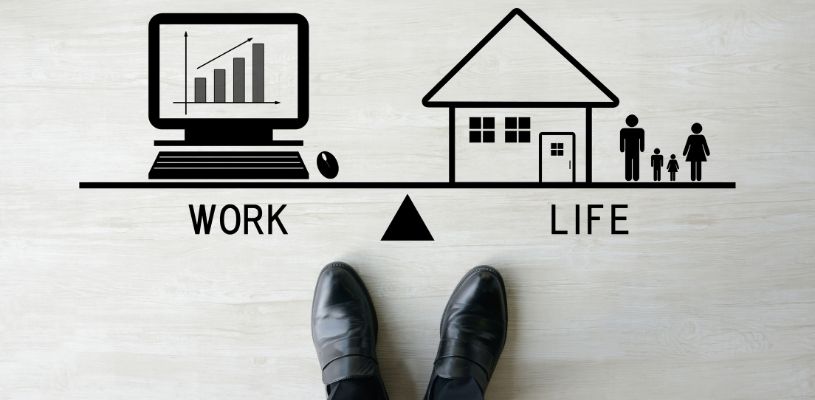Why is a Work-Life Balance Important?
Explore the importance of work-life balance. Find out how it can improve your health and productivity.

Did you know that approximately 77% of employees experience burnout at least once during their professional journey? The primary culprit behind this issue is a poor balance between work and personal life.
If you allocate all your time to your job while neglecting the joys of spending quality moments with your loved ones, you risk missing out on life's simple pleasures.
Conversely, disregarding your professional responsibilities can result in job insecurity and reduced performance at the workplace.
Therefore, it's crucial to maintain a healthy work-life balance between your professional and personal life. Join us as we explore an excellent work-life balance, its importance, and how you can achieve it.
What's Work-Life Balance?

The definition of work-life balance is the clear line between a person's professional responsibilities, family life, and personal interests.
Simply put, work-life balance empowers individuals to allocate their time and energy effectively to work-related tasks. The result? You can enjoy enough sleep, reduce stress, and have a more satisfying and fulfilling life without experiencing physical and mental exhaustion.
Mainly, a better work-life balance encompasses a wide range of techniques, including:
- Time Management
- Prioritizing Tasks
- Setting Boundaries
- Flexible Work Arrangements
- Personal Care
- Stress Management
What are the Benefits of a Healthy Work-Life Balance?
Maintaining a healthy work-life integration offers several advantages beyond having free hours for yourself and your overall well-being.
Let’s have a brief overview of what work-life balance means and how it can change your routine for good:
- Reduced Stress: Achieving work-life balance allows individuals to manage their work-related stress more effectively. When they have time to relax and recharge, they are less likely to experience chronic stress, which can lead to various health issues.
- Enhanced Physical Health: Balancing work and personal life enables individuals to prioritize their physical health. They can allocate time for regular exercise, prepare healthier meals, engage in personal activities, maintain healthy sleep habits, and schedule medical check-ups, reducing the risk of illness.
- Improved Mental Health: As the research shows, individuals working 55 hours a week are at a high risk of developing anxiety and depression due to poor work-life balance. Therefore, employees' work-life balance is crucial to reduce the chances of frequent burnout and workplace stress, leading to stable mental health.
- Increased Productivity: When individuals have a healthy work-life balance, they can focus better during working hours. They are less likely to feel overwhelmed, leading to increased productivity and efficiency.
- Greater Job Satisfaction: Employees not constantly stressed by work-related demands tend to be more satisfied with their jobs. This satisfaction can lead to better morale and a positive attitude toward work.
- Better Relationships: A balanced life allows individuals to spend quality time with family and friends. Strong personal relationships are essential for emotional well-being and happiness.
- Increased Creativity: Personal time and relaxation often stimulate creativity and innovation. Taking breaks from work can lead to fresh ideas and problem-solving approaches.
- Higher Energy Levels: A balanced life promotes higher energy levels because individuals have free time to rest and rejuvenate. This increased energy helps them tackle tasks more effectively and with enthusiasm.
- Career Growth: Overworking can lead to burnout, hindering long-term career growth. A balanced approach to work can lead to a sustainable and successful career.
- Improved Time Management: People with a balanced life often develop better time management skills. They become more efficient in both their professional and personal lives.
- Enhanced Work-Life Satisfaction: Achieving a healthy balance between work and personal life contributes to greater overall life satisfaction. People feel more content with the way they manage their responsibilities.
- Better Work-Life Integration: Instead of feeling torn between work and personal life, individuals with a healthy balance can integrate the two more seamlessly. This integration reduces conflicts and stress associated with trying to juggle multiple responsibilities.
Would you like a 4 day work week?
How to Maintain a Healthy Work-Life Balance in the Workplace?

Is your current work-life balance hindering your creativity? If so, consider these five strategies to enhance it with minimal effort.
1. Set Realistic Expectations at Work
While the standard workday is typically eight hours, certain professions or roles may demand more time, incredibly when Key Performance Indicators (KPIs) are demanding.
However, working excessively long hours at the expense of your personal life can lead to an unhealthy work-life balance and work-related stress.
To prevent this imbalance, communicate your concerns clearly with your HR department. Prepare for this conversation by explaining the factors contributing to burnout.
Additionally, propose potential solutions, such as workload reduction or requesting vacation time, to address the issue.
Taking these steps can help you avoid the consequences of an inadequate work-life balance.
Bonus Tip: When starting a new job, feel free to ask work-life balance questions during the interview to understand the company's culture better.
2. Learn to Say NO
As a dedicated employee, you may find yourself burdened with additional tasks during your work hours, which can negatively impact your work-life balance. While wanting to help is natural, saying yes to everything is a common mistake.
Adding more tasks to a packed schedule can lead to burnout without additional compensation. Therefore, it's crucial to politely decline functions that you believe may be unmanageable for you.
Here's a constructive way to decline without making the other person feel attacked:
- Express your willingness to help, but explain that you can't take on extra tasks due to your busy schedule.
- Offer alternative solutions, such as suggesting a specific timeframe when you can realistically address the task.
- Provide guidance or advice to your colleagues so they can handle the work themselves.
- Propose the idea of seeking assistance from another colleague or available resources.
By learning to say no tactfully, you can protect your work-life balance and ensure you have the time and energy for your professional and personal life.
3. Prioritize your Well-Being
While dedication to your work is admirable, it shouldn't come at the expense of your well-being. It's essential to strike a balance that encompasses both physical health and mental and emotional aspects of your life.
Allocate daily "me" time in your schedule to focus on personal growth. Consider activities such as meditation, regular exercise at the gym, reading, crafting, painting, and more.
By nurturing your well-being, you can achieve a balanced lifestyle, develop healthy habits, and reduce work-related stress and negative emotions.
4. Assess Your Priorities
At work, many tasks will come your way as always-on-world things. If you decide to perform each, you are more likely to neglect your personal life and mental health.
That’s why it’s an important step to prioritize your things effectively. When doing so, asking yourself the following questions can help:
- Which activity brings me closer to my growth, and whether I dedicate time regularly?
- Which tasks can be compromised and must be completed on time?
- What can I add to my schedule that makes me closer to a healthier work-life balance and allows me to meet childcare costs with fewer resources?
- Where can I find opportunities to combine my responsibilities in a way that allows me to fulfill multiple obligations simultaneously?
5. Explore Work-Life Balance Literature
Feeling drained from constant work demands? Looking to improve the harmony between your job and personal life? Exploring work-life balance literature can be the key to uncovering practical tips you might not know about.
First, explore resources like self-help books, research articles, and personal stories.
Work-life balance books provide practical tips and exercises, research articles give evidence-based insights into the importance of work-life balance, and personal stories inspire you with real-life success stories.
Summing Up
To sum up, maintaining a healthy work-life balance is crucial for physical and mental well-being. Despite the challenges a busy professional schedule poses, implementing the abovementioned strategies can lead to a better balance.
By emphasizing flexible work schedules, learning to say no when necessary, and dedicating time to your well-being, achieving equilibrium between work and personal life is attainable.
If you're seeking a job that values work-life balance and offers remote work opportunities, consider visiting 4dayweek.io. Explore our current job listings and embark on a journey toward a more fulfilling and balanced professional life.